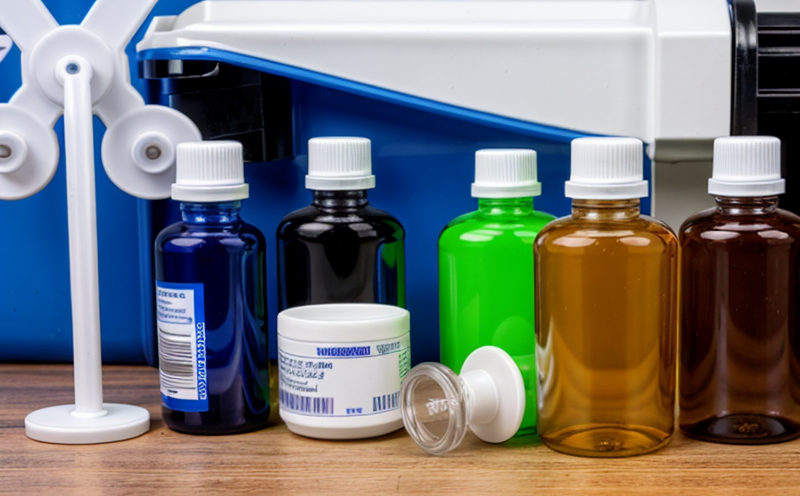EN 12457 Leachability of Pharmaceutical Waste Residues
The Leachability Test for Pharmaceutical Waste Residues (EN 12457) is a critical method used to assess the potential environmental impact of pharmaceutical waste. This test evaluates whether harmful residues from pharmaceutical products, particularly those disposed of in landfills or incinerators, can leach into the surrounding soil and water systems. Compliance with this standard ensures that waste management practices meet stringent environmental safety requirements.
The standard is widely recognized for its role in minimizing contamination risks associated with pharmaceuticals. It applies to various types of waste including unused medications, expired drugs, and other pharmaceutical products that might be discarded as part of medical or industrial processes. The test measures the leachate concentration of heavy metals, organic compounds, and other potentially hazardous substances.
The methodology involves the simulation of real-world conditions found in landfills where pharmaceutical waste is typically disposed. Specimens are placed under controlled conditions designed to mimic the environment’s moisture content, temperature variations, and chemical interactions over time. This allows for a comprehensive evaluation of how these materials might interact with their surroundings post-disposal.
Understanding the implications of this test requires insight into its broader applications within waste management and recycling sectors. For instance, pharmaceutical companies must ensure that their waste disposal practices align not only legally but also ethically with global standards like EN 12457. This helps protect public health and the environment by preventing harmful substances from entering the ecosystem.
Compliance officers play a pivotal role in implementing these tests across different stages of production, storage, transportation, and disposal. They need to stay updated on changes or new versions of relevant standards such as EN 12457 to maintain regulatory compliance. Similarly, R&D engineers benefit from knowing about this test because they can incorporate more sustainable design principles into future product development cycles.
For procurement professionals, understanding the leachability tests ensures that they select suppliers who adhere strictly to environmental protection protocols. By doing so, organizations contribute positively towards achieving sustainability goals set forth by various international bodies including those responsible for enforcing EN 12457 compliance.
Eurolab Advantages
- Comprehensive Expertise: Our team of experts has extensive experience in conducting various waste management tests, including those under EN 12457. This ensures accurate and reliable results.
- State-of-the-Art Facilities: We operate cutting-edge laboratories equipped with advanced instrumentation to perform precise analyses required by this standard.
- Regulatory Compliance: Eurolab maintains strict adherence to all international standards, ensuring that our services meet the highest quality benchmarks.
- Client Satisfaction: Our commitment to delivering high-quality results has earned us a strong reputation among clients in both national and international markets.
We pride ourselves on offering prompt turnaround times without compromising on accuracy or reliability. Clients can rest assured that their samples will be handled with the utmost care, ensuring consistent quality throughout our testing process.
Why Choose This Test
The EN 12457 leachability test is essential for several reasons. Primarily, it helps pharmaceutical companies and waste management facilities ensure that their practices comply with stringent environmental regulations. By demonstrating compliance through rigorous testing methods like those outlined in this standard, organizations can mitigate risks associated with potential contamination of soil and water.
Moreover, choosing EN 12457 ensures consistency in quality across different stages of production, storage, transportation, and disposal. This uniformity is vital for maintaining the integrity of pharmaceutical products throughout their lifecycle while also safeguarding public health.
The test provides valuable insights into how various types of waste behave under realistic conditions, enabling informed decision-making regarding future improvements in waste management strategies. It supports sustainable practices by encouraging the exploration of alternative methods that reduce harmful impacts on the environment.
For quality managers and compliance officers, selecting this test offers peace of mind knowing they are adhering to best practices recommended globally. R&D engineers find it particularly useful as it informs their efforts towards creating more environmentally friendly products and processes.
Competitive Advantage and Market Impact
- Reputation for Quality: By offering reliable EN 12457 compliance testing, Eurolab differentiates itself from competitors by providing consistent results that meet or exceed international standards.
- Client Trust: Our clients benefit from the trust and confidence gained through our adherence to these rigorous tests. This strengthens their own brand reputation in the marketplace.
- Prompt Service: Eurolab’s efficient service delivery allows clients to quickly address any concerns or issues related to waste management, giving them a competitive edge over slower competitors.
- Innovation Support: For R&D teams looking to innovate within this field, our expertise provides valuable data points that can be used to refine existing processes and develop new ones.
The demand for reliable environmental testing services continues to grow as organizations become increasingly aware of their responsibilities towards sustainability. By choosing Eurolab’s EN 12457 compliance tests, businesses not only meet regulatory requirements but also contribute positively towards achieving broader sustainability goals.





